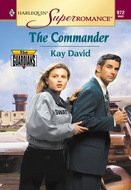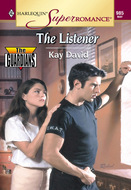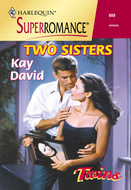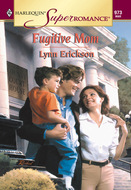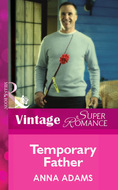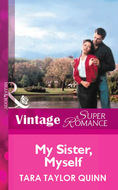Raamatut ei saa failina alla laadida, kuid seda saab lugeda meie rakenduses või veebis.
Loe raamatut: «Whose Baby?»
Somewhere there was another little girl
One she’d carried in her womb. She’d made so many promises to that baby as she dreamed of the future. She’d sung to her and laughed and tickled her own belly whenever a tiny toe or elbow surfaced.
But, through no fault of her own, she hadn’t kept those promises. Her baby had never heard her voice again. Someone else had taken her home. Did these other parents love her and sing to her and tickle her toes?
“If only…” Lynn breathed soundlessly. If only she could know. See that this other little girl was loved and cared for, read to and hugged, see that her artwork was on the refrigerator for all to admire.
But how could she ever find out, without contacting the hospital and telling them? Without taking the chance of losing Shelly?
That was the torment. Risk the little girl who was the center of her life for the one who couldn’t possibly remember her voice?
Lynn closed her eyes on a soft agonized exhalation. Risk her? How could she?
But how could she not?
Dear Reader,
I’m sure it won’t surprise you to hear that the idea for Whose Baby? came to me when I was reading about the recent case in which it was discovered that two little girls had been switched at birth. All of us, I’m sure, were transfixed when reading about this horrifying mistake. I’ll bet every parent thought immediately “What if…” Perhaps our deepest instinct is to protect our children. And yet…which child? If I found out one of my daughters wasn’t biologically mine, I’d feel no less fiercely protective, no less loving. And yet…I could so easily come to feel the same about the child I’d carried for nine months.
Any time I read or hear about something so emotional, the writer part of me kicks in and also wonders “What if…” What if the hero had lost his wife, and their biological child is all he has left of her? What if the heroine fears he wants both girls? Talk about conflict!
I don’t know that I’ve ever written a story with so many layers of painful and exhilarating emotion. Sitting in front of the computer each day, I felt as if I were unwrapping a gift from someone I’d loved and lost. Each layer was poignant, making me grateful for my own family.
See if you don’t feel the same!
Best,
Janice Kay Johnson
Whose Baby?
Janice Kay Johnson

Whose Baby?
CONTENTS
CHAPTER ONE
CHAPTER TWO
CHAPTER THREE
CHAPTER FOUR
CHAPTER FIVE
CHAPTER SIX
CHAPTER SEVEN
CHAPTER EIGHT
CHAPTER NINE
CHAPTER TEN
CHAPTER ELEVEN
CHAPTER TWELVE
CHAPTER THIRTEEN
CHAPTER FOURTEEN
CHAPTER FIFTEEN
CHAPTER ONE
O + O DOES NOT = B. So why was she even nervous?
Oblivious to the salt-scented breeze and the familiar whoosh of the broken surf, Lynn Chanak stared at the envelope in her hand. Open it, she told herself. Then you can quit worrying about nothing.
And nothing was just what it would prove to be.
That Portland lab had mixed up somebody else’s blood with Shelly’s. It was dumb to let the results shake her even for a minute. Poor Shelly had had to endure being stuck with a needle again, which still made Lynn mad, but it was done, over with, and now with the results from the new lab she’d be able to refute her ex-husband’s ridiculous accusation.
There was no way a second lab would make the same kind of mistake. Lynn and Brian both had Type O blood; heaven help her, she’d once been foolish enough to think that meant they were made for each other.
With both parents having Type O blood, Shelly had to have the same.
So why not open the envelope?
“Mama!” Lynn’s three-and-a-half-year-old daughter tugged at her sleeve. “See what I found?”
The small hand cupped a flame-red, wave-polished chunk of agate that beachcombing tourists would have killed for.
Lynn smiled in delight and hugged her daughter. “That’s a pretty one! You’ve got sharp eyes!”
She sat on a gray, winter-tossed log on the beach, the pile of mail in her hand. This was a daily ritual for her and Shelly when the shop was closed. Wait for the mail, don sweatshirts against the sharp breeze, and then walk the two blocks from home to the rocky beach, famous for the sea stacks that reared offshore. Otter Beach had been a tiny lumber town until the Oregon coast became a favorite tourist destination. Now streets were lined with art galleries and antique shops, and prime beachfront real estate was taken by inns and bed-and-breakfasts.
Lynn’s bookstore was one block over from the main street. The upstairs of the old house was home, the downstairs her business. During tourist season, she stayed open six days a week. By the time winter storms pounded the coast, she only bothered to open from Thursday through Sunday for locals and for the few hardy souls who came for romantic weekends and beachcombing after storms deposited Japanese floats and agates on the shore.
“I’ll give this to Daddy next time he comes,” Shelly announced. “C’n you save it for him, Mommy?”
“You bet, sweetie,” agreed Lynn, hiding her dismay. How was she going to explain to a three-year-old why Daddy wasn’t visiting anymore?
Giggling, Shelly wormed her hand into the pocket of Lynn’s faded, zip-front sweatshirt to deposit her find. The chunk of agate joined the crab claw and the mussel shell entwined with dried seaweed that she’d already collected.
For a moment Lynn watched as Shelly wandered away. She looked so cute in her denim overalls and rubber-toed sneakers, her mink-brown ponytail straight and sleek. Lynn tried hard to see what Brian did, but how could she? This was her daughter.
So what if her own hair was a warm, wavy chestnut-brown, if Brian was blond? So what if Shelly’s eyes were brown, while Lynn’s were green and Brian’s blue? Kids didn’t always look just like their parents. In fact, they hardly ever did. The genes that created a person were like…like the threads of color in a Persian carpet, thousands of bits of wool, woven together with a complexity that defied any ability to say that a certain blue came from such and such a sheep. Shelly might look like some forgotten great-grandmother. Did it matter that her face wasn’t a reflection of her father’s?
Apparently it did to Brian. He’d always been unreasonably jealous, both before they were married—when Lynn considered possessiveness romantic—and after. The marriage had been a mistake, a terrible mistake. Guilt ate at Lynn every time she thought about Brian, because she knew the failure was hers. She shouldn’t have married him. He was right, when he had believed she didn’t love him enough.
But she had never been unfaithful. There hadn’t been another man; probably never would be, now that she knew she wasn’t capable of the kind of passion a lifetime commitment required. She hadn’t given Brian any reason to suspect she was seeing anyone, so it outraged her that now he should claim Shelly wasn’t his.
Lynn bitterly resented having to put a three-year-old through the scary process of having blood drawn, but she’d done it. Not just because she needed Brian to keep paying the child support, but also because Shelly needed her dad.
So why wasn’t she tearing open the envelope? Lynn wrenched her gaze from Shelly, crouched on her heels ten yards down the beach staring with intense fascination at something, and studied the return address on the envelope. McElvoy Laboratories, Seattle, Washington.
A different lab. Lynn hadn’t taken Shelly back to their regular clinic for the second blood draw. She’d driven to Lincoln City. Of course she should have marched back into their doctor’s office, waving that stupid piece of paper and proclaiming her indignation at the mistake. She shouldn’t have had to pay for the second round of analysis. But she’d felt…cautious.
She made a face. Gun-shy. Brian had made her paranoid. She didn’t want to give him any ammunition. If he knew about the first results, he wouldn’t believe the second ones. He’d want more, instead of accepting the truth when she handed it to him.
Anyway, a voice whispered, what if it wasn’t a mistake? Shelly doesn’t look like either parent.
“Oh, right!” she said out loud. For Pete’s sake, she’d been awake and present during her awful labor. Sure, because of the hemorrhaging, she hadn’t seen her newborn daughter for the first hours, but then they’d laid the tiny red-faced baby at her breast, and she’d held her and loved her ever since. And, damn it, so had Brian! Only, now he had to get suspicious. Or cheap. He was late sometimes with the child-support check. Think what a good excuse this would be not to pay at all!
Lynn glanced up again; her daughter was in the exact same spot. A miniature tide pool, probably. Shelly had learned not to take living creatures from them, only to observe. She’d seen the difference between the rich color of a sea star clinging to a rock beneath the water and the dull hard body of a dead preserved one. She loved the scamper of tiny crabs, the dart of brown sandpipers, the hoarse roar of sea lions on the rocks offshore. This was home, magical and familiar at the same time.
Like having a child. For fleeting moments, Lynn saw through her daughter’s eyes and became three years old again. Wondering, awed, frightened, reassured by simple comforts.
Other times, Lynn was perplexed by this complete, small person her daughter seemed to be. It was as if she’d been born whole, finished, and all Lynn could do was open the world to her. The idea that a parent could shape her child was as silly as believing the same blood type meant two people were mysteriously akin.
Open it.
Lynn couldn’t understand her reluctance. She kept fingering that damned envelope. She’d peeked at all the bills, even flipped through a couple of publishers’ catalogs as if their spring lists mattered more than the blood that traced pale blue lines beneath the translucent skin of her daughter’s wrists, that beaded crimson when Shelly skinned her knee. Lifeblood.
Still Shelly crouched in the same spot, her attention span astonishing for a child her age. She didn’t need her mom right now, except as home base. A pocket and a smile and a hug.
Lynn tore open the envelope and pulled out the single sheet of paper. Unfolded it, and stared down at the bald black letter B. There was more, but she didn’t see it.
Her heart pounded so hard she wouldn’t have heard Shelly scream. Her vision misted, and she had the eerie sensation of being alone on the beach after a late-afternoon fog had rolled in. Everything was gray, indistinct, abruptly looming in front of her and then swallowed behind her.
Oh God, oh God, oh God.
There had been no other man. Only Brian, ever. If Brian wasn’t the father of Shelly Schoening, then she—Lynn—wasn’t her mother, either.
How was that possible?
She moaned and hugged her knees. How?
She could think of only one answer. Somehow, two babies had been switched in the hospital. The little girl laid to nurse at her breast wasn’t the one she’d carried for nine months. Her own baby had been given to another mother.
Somewhere, a toddler with bright blue eyes like Brian’s or chestnut-brown hair like Lynn’s called another woman Mommy.
Lynn whimpered again.
“Mommy?”
Swallowing her terror, Lynn looked into Shelly’s frightened brown eyes. “Yes, honey?” She sounded only a little hoarse.
“Is Mommy sick?”
To death. Her whole world was her daughter. Not that unknown child somewhere, the one who might look like her, but this child—the one she’d nursed and diapered, whose toes she’d tickled and counted, the one who squeezed her hand and waited for an answer.
“No,” she said. “Yes. Mommy’s tummy felt funny for a minute. Like this.” She burrowed her hand inside the OshKosh overalls and tickled until Shelly’s elfin face crinkled with a giggle.
Shelly wrapped her arms around her mother’s neck and pressed her cold, plump cheek against Lynn’s. “I wanna cheeseburger,” she confided. “And chocolate milk.”
Lynn hugged back. Hugged until the toddler squeaked with alarm.
“You know what?” Lynn said. “A cheeseburger sounds good to me, too. And chocolate milk. What do you say we go home?”
Shelly nodded vigorously. Lynn rose from the log, feeling as stiff as an old woman. She collected her pile of mail and took her daughter’s small hand. Feeling numb, she turned her back on the waves, her sneakered feet accustomed to the way the beach stones and sand gave with each step. One forward, half back. A struggle that strengthened the body.
Her daughter chattered. Lynn heard not a word, although she smiled and agreed.
She focused passionately on only one thought: Shelly was hers. Nobody must ever know that maybe, somehow, she wasn’t.
After lunch, while Shelly napped, Lynn sat at the kitchen table and convinced herself that Brian couldn’t insist on this blood work. She’d give up the child-support money first, tell him he could think what he liked. Even agree that he was right, although she hated the idea of letting him believe she’d sneaked around and had sweaty sex with some man she hardly knew—because, after all, she had no real friends who were male.
It took until five o’clock for Lynn to get angry. She put water on to boil for macaroni and went to check on Shelly. She was curled at one end of the shabby velveteen couch watching Dumbo for the thousandth time. Her flowered flannel blanket was tucked under one arm and her thumb was in her mouth. On the dentist’s advice, Lynn had been trying to break her of sucking her thumb, but tonight she didn’t say anything, just kissed the silky top of Shelly’s head and breathed in her essence before going back to the kitchen.
Things like babies getting switched in the hospital didn’t happen! she thought incredulously, then more firmly. Parents were always afraid they would, but hospitals took such precautions these days. Lynn still had the plastic band that had been around Shelly’s plump wrist when she was released from the hospital. It had exactly matched Lynn’s.
No. There had to be some other explanation.
This lab was wrong, too?
She poured the macaroni into the boiling water and frowned.
Wait! Could Brian have lied about his blood type? She stirred the macaroni and tried to remember. Had she said what hers was first? It would be like him to try to create a fiction to make it sound as though they were destined for each other. He’d wanted her from the first time they’d met, in the bookstore where she’d worked after she graduated from college.
Closing her eyes, Lynn tried to replay the scene. A popular professor at the university had been in a car accident, and the English department had held a blood drive. She’d been resting after giving a pint, when the nurse pushed back the curtain and said, “If you’ve finished your juice, you’re all set!”
And there Brian was, on the next gurney. Still lying down, he’d turned his head and grinned. “Hey, they’ve been sucking blood out of you, too, huh?”
He’d come into the bookstore for the first time just the previous weekend. Or, at least, she’d noticed him for the first time. And how could she not have noticed him? He was six feet two inches, with short sun-streaked blond hair and bright blue eyes. He was tanned from skiing at Mount Hood. She’d asked, because it was winter and most people in Portland were pale. He looked like a surfer, broad shouldered and athletic and golden.
“Well, it was voluntary,” she’d said shyly.
“Yeah, so they say.” He waved away the orange juice and sat up without taking it slowly. How like a man!
Somehow they ended up walking out together. And…yes! He’d asked, “What type blood do you have?”
She did volunteer the information first. She distinctly remembered the way he’d turned and said, so seriously, “That means the same blood runs through our veins. We must be meant for each other.”
She’d made it a joke; they’d both laughed, but a small thrill had run through her at the idea, presented with the intensity and gravity of a marriage proposal.
The more fool her!
She dumped the macaroni into the waiting colander, jumping when the boiling water splashed her hand. She should have known better. The single, chipped porcelain sink was shallow, and she was always careful.
Tears sprang to her eyes. “Damn, damn, damn,” she muttered, turning on the cold water and sticking her hand under it.
Why, that creep! All this anguish, and he’d lied!
She told herself she was furious, but really relief flooded her in a sweet tide. Such a simple explanation! And after she’d come up with such a convoluted one.
The relief lasted all evening. She played Chutes and Ladders with Shelly, then told silly stories and every knock-knock joke she could think of at bedtime, buoyed by that wash of exquisite release from fear.
She thought about calling him, the scumbag, and saying, “I might think about checking our daughter’s blood type, if I knew what yours really is.”
But, although she should be madder than she was, Lynn still thought she should cool down before she confronted him. Besides, she wanted to be sure of herself.
She could ask his mother. No, better yet, she could call the blood bank and say that he’d been in a car accident, and she didn’t remember his blood type but she knew he’d donated.
That was the moment when she remembered. There she was, checking to be sure the bathroom door was open enough to cast light into the hall so Shelly wouldn’t get scared if she woke up later. One part of Lynn’s mind thought, six inches, that’s perfect, and another part was wondering if she shouldn’t add more books on tape to her stock downstairs—a man, a tourist, had asked for them Sunday, and left without buying anything after looking at what she did have—and oh yes, she had to pick up peanut butter at the store tomorrow, since Shelly practically lived on it.
Through all her other preoccupations, she felt the onset of fear and the prickle of goose bumps on her skin even before a memory came to her. A woman from the blood bank had called, not long after Lynn and Brian got married, and she’d asked Lynn to encourage her husband to donate blood again.
“He’s got Type O, you know,” she said, “and we’re terribly short.”
Lynn had said helpfully, “My blood is O, too,” and she’d promised she would ask Brian, but she’d definitely come down to the blood bank herself. She had, and he must have, too, after work, not romantically together this time. That part didn’t matter; what did was that the blood bank had specifically wanted him to come in because he had O.
Instead of going to bed, Lynn felt her way back along the narrow hall to the kitchen, with its tiny refrigerator so old she had to regularly defrost the freezer part, the linoleum with the pattern worn to a blur, the brand-new shiny white stove, bought when the old one gave up the ghost at the worst possible moment, the way it always went. In the brightness when she switched on the light, the cheery yellow she’d painted the cabinets looked garish, a disguise as obvious as a clown’s red nose.
The living quarters of the house were crummy; she’d put all her money into the downstairs, the bookstore. She’d had to. She and Shelly could make do, Lynn had told herself. Until the store became really profitable. If bookstores ever did.
But now she couldn’t help looking around and imagining what other people would think. If, for example, Shelly’s real, biological parents were trying to take her back.
I wouldn’t look very good, would I? Lynn thought. Her knees crumpled, and she sank onto one of the two mismatched chairs that went with the tiny, scarred Formica and metal kitchen table. I don’t have much to offer Shelly materially, and I’m divorced, and my ex-husband thinks I must have cheated on him.
Those other parents, they could take Shelly away from her. She remembered a photo from some horrible child custody case, when the little boy was screaming and reaching for the only parents he’d ever known while the biological father carried him away. How painfully easy it was to transpose faces: she was the one trying to be brave, make this seem like the right thing, while Shelly was ripped away from her like one of the beautiful sea stars from a slick wet rock.
Oh God, oh God, oh God.
She drew up her knees and hugged herself and shook, panting for breaths. She could hear herself gasping. She must be in shock, she felt so strange. Cold, and frightened, as if an intruder had crept in and violated her, as if she would never feel safe again.
Nobody must ever know. That was her only hope. Nobody. Ever.
Eventually the shaking passed, and she saw again her kitchen, tidy and spotlessly clean, however shabby, and on the refrigerator Shelly’s bright crayon drawings that were supposed to be sea stars or seals or horses, those inner imaginings that her short fingers were not yet capable of rendering. It was home: loving, safe, clean and ordered. What else mattered? Certainly not money.
Nor blood. She didn’t care whose ran through Shelly’s veins. She would never let it matter.
But first, she had to be sure.
The blue plastic clock on the wall said eight-thirty. Not too late to call Brian’s mother.
Ruth Schoening’s voice held caution, once she knew who was on the phone.
“Lynn. My, it’s late in the evening to be calling.”
Not: Oh, gracious, Shelly is all right, isn’t she?
Lynn noticed the lack, and decided on honesty. “Brian’s told you he doesn’t think Shelly is his daughter, hasn’t he?”
The pause resonated with awkwardness. “He did say something.”
“I would never…” The automatic denial caught in Lynn’s throat. Oh, God. She might someday have to claim she had. She took a breath. “You don’t believe that, do you?”
Really, she was begging, You know me. Please say that you have faith in me, that you love Shelly no matter what.
“It’s not really my business,” her ex-husband’s mother said, the constraint in her voice obvious.
“She’s your granddaughter.”
“Is she?”
She had begun to shake again, Lynn noticed with peculiar detachment. “This is so ridiculous,” she exclaimed, trying to laugh and failing.
“I hope so,” Ruth said. “But, you know, he’s right—Shelly doesn’t look like anybody in the family.”
“When my grandmother was a little girl…”
“Brian said he’d looked through your family album, and Shelly doesn’t look like anybody on your side, either. She’s so…so dark, and with that pointy chin she makes me think of, oh, a pixie from a fairy tale. My children were round and sturdy and blond. Like little Swedes.”
She always said that as if Swedish children were fairer than any other kind. She never addressed the fact that Schoening was a German name, not Scandinavian.
Obviously, there would be no assurances of unfailing love no matter what. Shelly would lose her grandparents, too, if it came to that.
“Well,” Lynn said, “the reason I’m calling is that I’m considering having Shelly tested so we can lay this foolishness to rest. It makes me mad to have to subject her to needles and all that scariness, but I might do it. So what I wondered is, do you remember what Brian’s blood type is?”
“Oh, yes,” his mother said promptly. “He’s O positive, just like me. What a good idea, Lynn! Doubts should always be laid to rest, don’t you think?”
Fury kindled in her breast. Now that she’d gotten what she wanted, she let anger have its rein, sharpening her voice. “What I think is that all this is incredibly insulting. I understand that Brian’s still angry about our divorce, but you know me better than to believe this…this hogwash. You claim to love Shelly. You always say I should bring her for visits more often, that she’s adorable, that I should send pictures so you can show all your friends, and now you talk about her as if she’s tainted and you’ve always known something was wrong with her. She’s…she’s a bright, beautiful child whose eyes don’t happen to be blue. Well, I’m not Swedish, and I don’t expect my daughter to look like she is!” Lynn ended with a snap. “That’s what I think.”
She didn’t wait for a response. She hung up the telephone in a righteous rage that deserted her too quickly. How could she get mad, when Shelly wasn’t Brian’s daughter? Maybe she was the one who was blind! Maybe she should have realized immediately that something was wrong, that the baby the nurses handed her was a changeling.
But she hadn’t, oh, she hadn’t. Instead, the connection had been deep and instant, a mother’s love for this child and only this one.
Well, the fierceness of her love hadn’t diminished. She would tell Brian that she wasn’t going to get Shelly tested, and if he cut his daughter off, so be it. She would let him live with a creeping feeling of shame. It would serve him right.
She stood up, as wearily as if she’d just overcome a violent bout of flu, and turned off the kitchen light, using the glow from the bathroom to find her way to her bedroom.
Life might get harder; Shelly would be hurt that her father didn’t want her. But no one must ever know.
THE DREAM CAME EVERY NIGHT from then on. She was searching desperately for someone. For her little girl. First she was on the beach, and she’d been reading her mail, and the fog had rolled in, and she looked up suddenly and realized she couldn’t see her.
“Shelly!” she began crying. “Shelly, where are you?” She leaped to her feet and spun in every direction, crying over and over, “Shelly!”
She began stumbling toward the water. Boulders reared from nowhere, tripping her. The roar of the surf filled her ears, and she knew with sickening certainty that Shelly had been caught by a wave.
But, no, she wasn’t on the beach at all. She was in a city, although the fog still played tricks with her eyes. The sound was from traffic. Oh, no! How could she have looked away, even for a moment? The sea was merciless, but cars were deadly.
She searched the sidewalks frantically for a bright chestnut head. People passing ignored her. Then she saw her, out on the median, cars racing by without slowing at all for the toddler who teetered there. She wore rags; she looked like Cosette in Les Misérables, wretched and unwanted. Brimming with tears, her bright blue eyes met Lynn’s momentarily through a break in the traffic, but without recognition.
My daughter doesn’t know me, Lynn realized with horror.
“Stay where you are!” Lynn screamed. “Wait! I’m coming!”
But her voice meant nothing to this child, and with greater shock Lynn discovered she didn’t know her own daughter’s name.
Sobbing, the little girl stepped from the curb.
And Lynn awakened, as she did every night, her screamed “No!” trembling on her lips and tears running down her cheeks.
With a moan she curled into a ball and shuddered. At last she went into the bathroom and splashed cold water on her face, then stared hopelessly at herself in the mirror.
Of course she was having dreams; their content was hardly subtle.
Somewhere out there was another little girl, one she’d carried in her womb. How many promises she’d made to that baby as she dreamed of the future! She sang to her and laughed and tickled her own belly when a tiny toe or elbow surfaced. She played music and danced and read aloud, just so her child would know her voice, would know she was loved.
But, through no fault of her own, she hadn’t kept those promises. Her baby had never heard her voice again. Someone else had taken her home. Did these other parents love her and sing to her and tickle her toes? Or had she gone home with a teenager who hadn’t really wanted to get pregnant? Perhaps she was in a foster home, or had an angry father who shook her when she wouldn’t quit crying. What if she was slow to develop, but nobody was patient? Or what if they loved her, these parents, but they were raising her the only way they knew how, by spanking her when she got cranky or broke something, by screaming at her with the anger of their own childhoods in their voices?
“If only…” Lynn breathed soundlessly. If only she could know. See that this other little girl was loved and cared for, read to and hugged, that her artwork was on the refrigerator for all to admire.
If she knew, the dreams would go away.
But how could she ever find out, without contacting the hospital and telling them? Without taking the chance of losing Shelly?
That was the torment. Risk the little girl who was the center of her life, who meant everything to her, for the sake of one who couldn’t possibly remember her voice. Who would have forgotten her songs and the stories she’d promised to finish someday, when they could giggle together.
She crept down the hall like a ghost to her daughter’s room, hovering in the doorway because the bed nearly filled the space, which in a house of this era had probably been meant as a sewing room or a nursery. Sunny yellow and black cats frolicked among sunflowers on the wallpaper that climbed the slanted ceiling. Yellow curtains covered the tall sash window. Under a pale lemon-yellow and white comforter, Shelly slept peacefully. Lynn could just make out her face in the glow from the hall, and thought, Ruth is right. She looks like a Celt from old stories, a fairy child, with that small, pointy chin, that high curving forehead and glossy brown hair as straight as promises that were kept.
Risk her, for the dream child?
Lynn closed her eyes on a soft, agonized exhalation. How could she?
How could she not?
Tasuta katkend on lõppenud.

